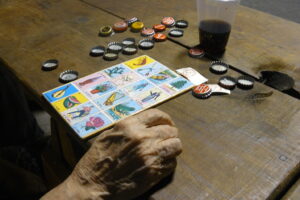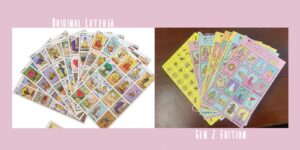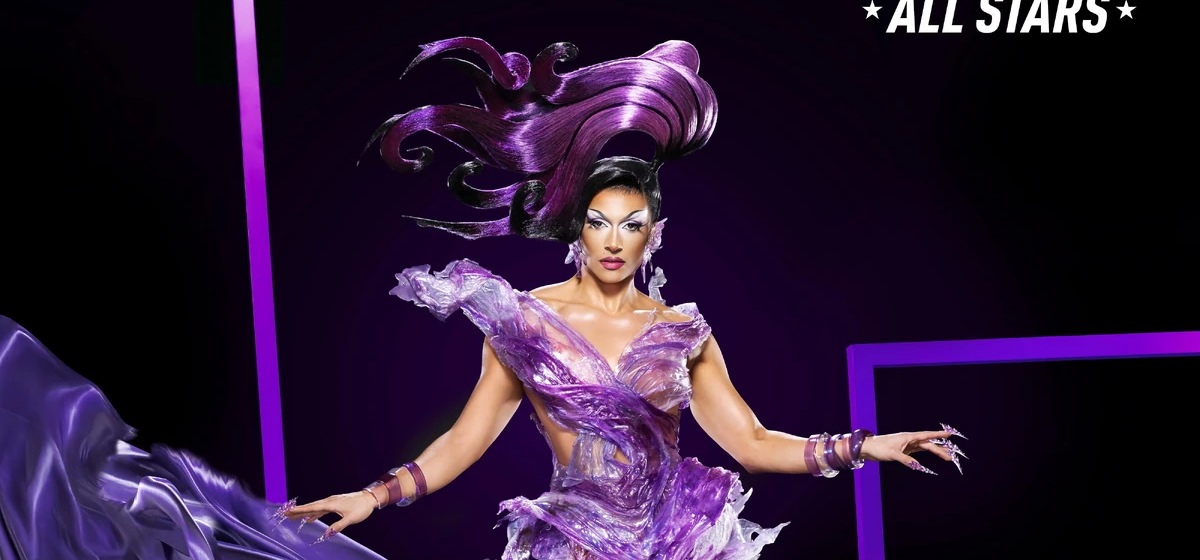Only four years have passed since Guatemalan-born Creative Director Mike Alfaro ingeniously updated lotería, the so-called “Mexican Bingo” game played in Latin America for centuries. It was late 2018 when Alfaro first released the complete set of Millennial Lotería. But these four years have felt like nothing short of a lifetime. Wearied by a worldwide pandemic, a war in Ukraine, and an intense bout of inflation, it is only normal that the talented and world-savvy Alfaro has reassessed his original creation. He has done so twice. In late 2022, Blue Star Press released the Y2K Edition of Millennial Lotería and more recently—in March of 2023—a Gen Z Edition hit the market. The distinctly lo-fi game is seemingly having a bit of a moment during our hi-tech times—so much so that it has even inspired a book-length scholarly study. With the game’s origins in Renaissance Italy and its subsequent heyday in 19th-century Mexico, its history is undeniably fascinating. And who doesn’t like games of chance?

The original lotería’s earliest aficionados were lovers of language, keen observers of society types, and curious spectators of everyday absurdities. A caller or cantor would describe one of the cards via clever, carnivalesque, or even lascivious word games, double-entendres, and turns of phrase. Participants would cover the corresponding image with a counter—usually a bean—in hopes of being the first to fill their entire card. In interviews, Alfaro has proposed that his contemporary version speaks directly and reverently to Latinx cultural heritage. His new lotería serves to renew interest in a game that is all too often relegated to Abuelita’s junk drawer.
With the Gen-Z Edition, many of the modifications made to the original Millennial Lotería are welcome and timely—if not downright prescient. While the Millennial Lotería re-envisioned El Sol from the original game as a El Global Warming, the newest, Gen-Z Edition renders the classic El Árbol as a pine tree aflame, now titled La Climate Crisis. Alfaro’s slight change is actually rather astute, given that the impending ecological apocalypse has led to remarkably contradictory climatological phenomena—scorching hot summers coupled with arctic waves in unlikely places. The future promises not just to be warmer but also, weirder. Also fortuitous are some of Alfaro’s eliminations between the first Millennial Lotería and the Gen-Z Edition. Indeed, the fact that the previous image of El Twitter is now gone, seems almost clairvoyant. That a card titled La Student Debt has been removed simultaneously feels inappropriate and all too appropriate, given that recent attempts to free students from their crushing loan payments has faced intense opposition. Our student debt lives on, yet ironically has ceased to be a topic of debate!

That the Millennial Edition’s El Virtural Reality card wasn’t removed is somewhat surprising, although future product releases from Apple may change that. A card representing Los Tide Pods also (and thankfully!) feels remarkably dated on the flip side of the Covid-19 pandemic. Who, faced with the very real specter of a deadly virus, would willfully try their luck by downing a plastic capsule filled with clothes detergent? Cards representing Los Crocs and El Zoom still seem relevant given how much the pandemic transformed our sartorial choices. Finally—and perhaps in homage to contemporary Latinx popular culture—the runaway success of Bad Bunny alone would justify Alfaro’s inclusion of El Bucket Hat.
Perhaps the most striking change between Alfaro’s original Millennial Lotería of 2018 and the 2023 Gen-Z Edition is a newfound focus on relationships: specifically, how our bonds with others seem increasingly mediated by the technological devices we always seem to have at hand. We see cards that represent El Ghosting, La Catfish, and El Clap Back, each of them indicative of how the anonymous character of the internet allows us to treat others badly. Also included are cards showing La Red Flag, El Toxic, and La Spill the Tea, emblematic of how quickly information is disseminated in cyberspace, and how instantly one is typecast. Tellingly, El Introvert is also here, suggestive of how we are compelled to relate to others socially, even while technology allows us the ability to effectively turn off or, at least turn away. In this way, the Gen-Z Edition is successful as a measure of our contemporary neuroses.

Mike Alfaro’s Millennial Lotería is a joyfully bilingual testament to the richness of Latinx culture. It would surely be a worthwhile addition to any upcoming parrandas during Hispanic Heritage Month. Yet, perhaps upcoming editions of the game (and future generations as well) could pay closer attention to cultural uniqueness. The postmodern panache of mixed media that is Millennial Lotería would do well to seek out contemporary interpretations of Latinx communities and contributions. Could there be a card, for example, representing the guilty bicultural pleasure that is Dorilocos? Or instead of the lotería’s traditional el harpa, an image of our generation’s consummate party-starter: El Sonidero? In this sense, the Gen-Z Edition of Millennial Lotería has lost a bit of the brilliance found in its original concept. Namely, that today’s hipster really isn’t that different from yesterday’s Catrín. He may, however, be remarkably and uniquely part of the Latinx community—through time and across generations.
Photo Credit: Issa and Fernando Mafra on Flickr and Kevin Anzzolin











